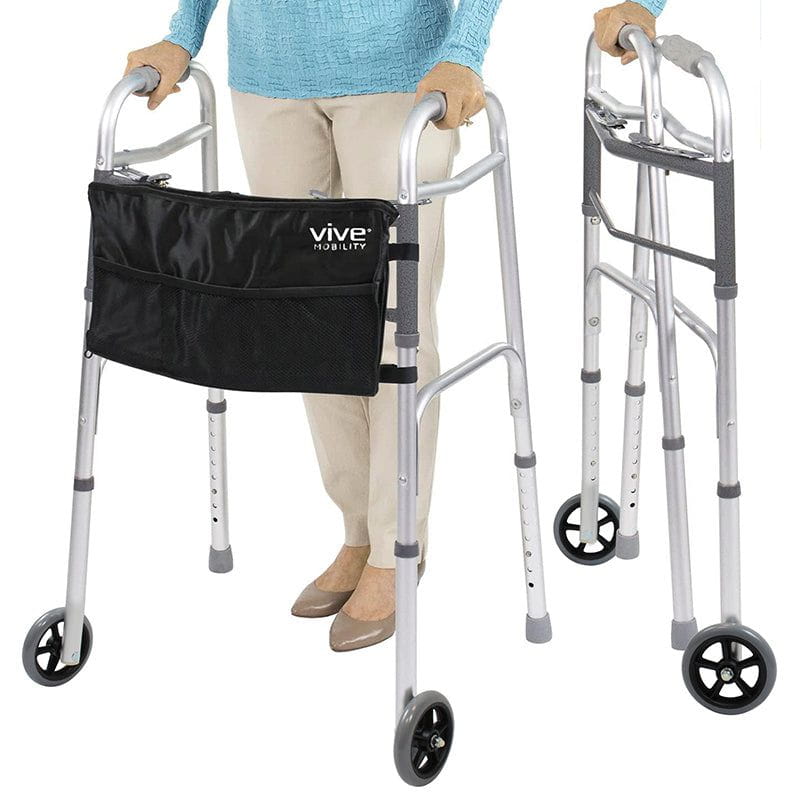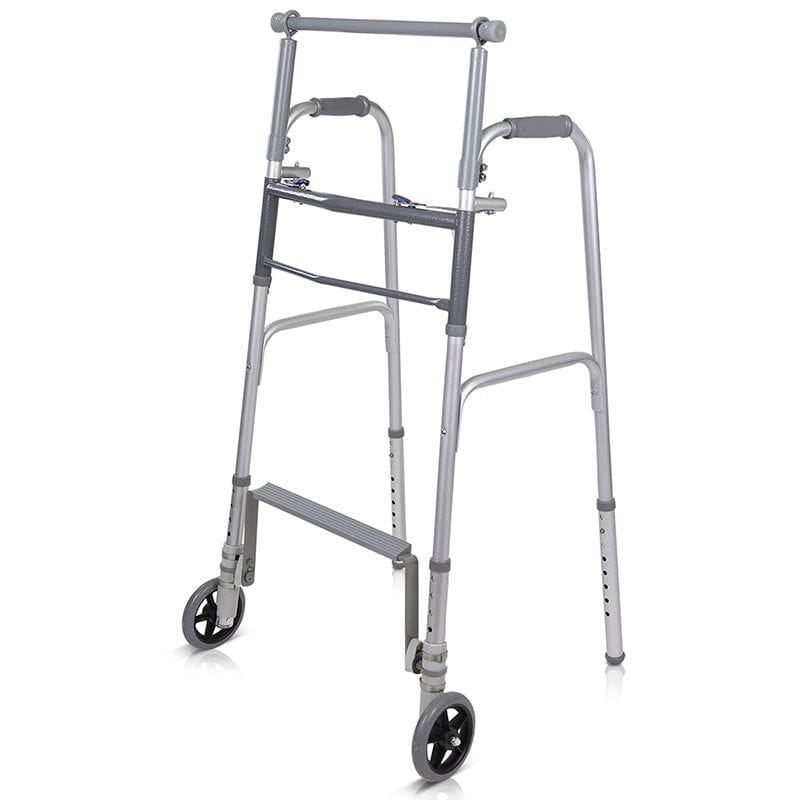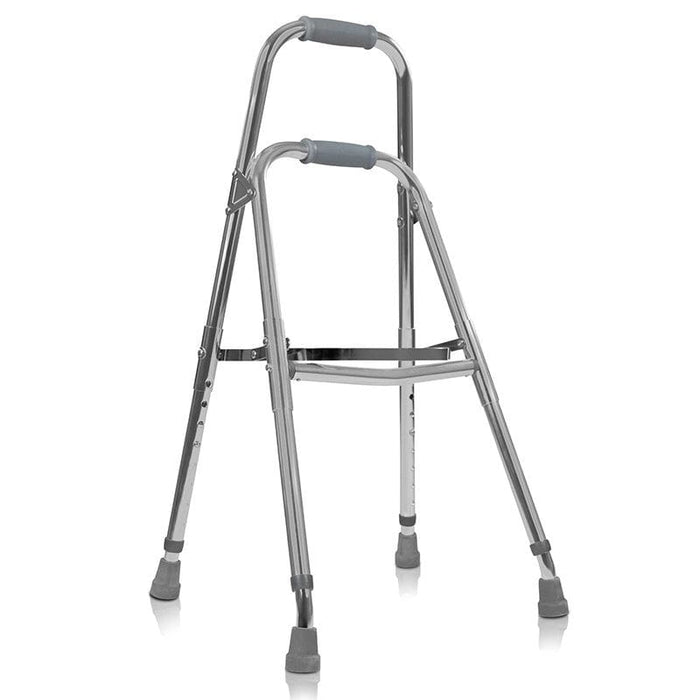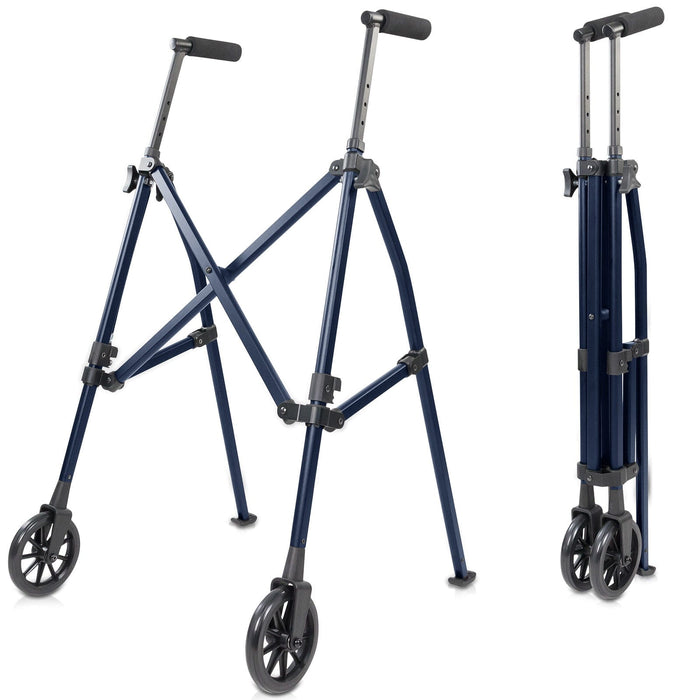800-487-3808
800-487-3808

Choosing the right walker can make a significant difference in maintaining independence, safety, and mobility, especially for those recovering from surgery, managing chronic conditions, or navigating the effects of aging. Vive Health offers a wide range of walkers, each designed to meet different levels of support and lifestyle preferences. In this post, we’ll compare the various types of walkers we offer and explore why the right walker for your specific needs is essential.
It’s important to understand the key differences between walkers and rollators—especially since a walker may be the better choice depending on your level of support needs.
Learn More About Rollators and the Models We Offer Here
Let’s break down the individual features of each wheelchair model to help you decide which factors will best suit your needs.
Standard walkers feature a straightforward, traditional design with a sturdy metal frame, front wheels, and stationary rear legs for dependable support with every step. These walkers provide the greatest level of support and solid stability and are designed to promote a slower, safer walking pace. If this is the type of walker you are looking for, check out our Folding Walker.
Unlike standard walkers that must be lifted and placed with each step, our rolling walkers are designed to glide smoothly and be pushed forward, offering easier, more continuous movement; similar to rollators, but without a seat or handbrakes. These walkers require slightly more balance and coordination to manuever safely. Our Compact Airframe Walker has two front wheels while the 4-Wheel Airframe has 4.
Adaptable walkers offer features that aren’t typically addressed with a standard walker. For example, the Hemi Walker is designed for users with limited strength or mobility on one side, providing stability with a single-hand grip. Similarly, the Stand Assist Walker features a specialized hand and footbars to help users transition safely from sitting to standing—something standard walkers may not adequately support. These modifications make adaptable walkers a more versatile solution for tailored mobility needs.
Folding capabilities are essential in a walker as they allow for easy transport, compact storage, and greater convenience in daily use, especially when navigating tight spaces or traveling. All Vive walkers are designed with this practical feature, ensuring they can be quickly folded and stored in a car trunk, closet, or beside a chair, without sacrificing stability or support.
Our Compact Airframe Walker folds to our most compact design for easy and lightweight transportation.
Our walkers are constructed using aluminum frames. Aluminum is ideal for walker frames due to its combination of strength, lightness, and resistance to wear. This makes it a preferred material for both users and caregivers who need reliable, easy-to-handle mobility aids. Key advantages include:
Walkers come with either stationary or pivoting wheels, and choosing the right design will depend on the user's capabilities, strength, and coordination. Here are the main differences.
These wheels roll forward and backward but do not swivel, providing greater control and stability, ideal for users who need extra support and are walking primarily straight paths.
Our Standard Folding Walker, Compact Folding Walker, and Stand Assist Walker are designed with stationary front wheels.
Also known as swiveling wheels, these allow for easier turning and smoother navigation around corners, making them better suited for more active users with good balance who need greater maneuverability in tight or crowded spaces.
If you’re looking for this type of walker, check out our 4-Wheel Airframe Walker.
Since standard walkers have 2 stationary front wheels, they do not come equipped with handbrakes. In contrast, our 4-Wheel Airframe Walker features both front pivoting wheels and rear rolling wheels, so this design has an integrated braking system, allowing for smooth, continuous movement and safer maneuverability.
All of our walkers are height adjustable at either the handles or the legs of the device. Check the listing details before purchasing to ensure the walker you select can be adjusted to the proper height for safe and comfortable use.
Don’t forget to check the weight capacity to ensure safe use.
The 4-Wheel Airframe, Stand Assist, Hemi, and Compact Airframe Walker support up to 300 lbs, while the Standard Walker accommodates up to 250 lbs.
Essentially the shoes of your wheelchair, a smooth and safe ride is dependent on the quality of its wheels. The wheels or tires we choose for each Vive Mobility Wheelchair does vary. Here are the different types, which wheelchairs they are on, and the benefits of each.
We understand the importance of keeping your essentials secure and easily accessible. The Standard Walker includes a convenient storage bag that attaches to the front of the frame, perfect for storing your wallet, phone, medications, and other necessities.
Customize your walker with ski glides (similar to Tennis Balls) that make it easy to maneuver over cracks, rugs, doorways, and any other uneven terrain. They attach to most walkers and even include velour covers to protect floors. We also offer Ski Glide Covers that are sold separately.
A walker tray can conveniently turn your walker into a portable surface for dining, snacking, using a laptop, or reading. This is beneficial for those who may struggle or need assistance transferring to a seat at a table. Check out this one with side pockets for extra storage.
Standard walkers can place pressure on the wrists, often leading to fatigue, aches, and discomfort. Adding extra cushioning offers essential support and comfort, helping to reduce strain and improve the overall walking experience.
Try our Foam Walker Grips or Sheepskin Walker Grips
A forearm platform can enhance usability by providing improved support and stability for individuals with reduced grip strength or coordination issues. It allows users to distribute their weight evenly, minimizing strain on the wrists and hands, which is particularly beneficial for those with conditions like arthritis.
The Vive Rear Walker Wheels with Brakes significantly improve your mobility and maneuverability while using a standard folding walker, allowing for easier navigation over various surfaces and ensuring smoother movement. These wheels minimize the effort needed to lift the walker, while the integrated brake feature securely locks the wheels in place for added safety when seated or taking a pause. This option also serves as a cost-effective alternative for those who may not be ready to invest in a rollator walker.

The Standard Walker and 4-Wheel Airframe Walker are our two most recommended models. Both are designed for everyday use and support, and the best selection will be based on the user's needs, strength, and stability. If the user requires a higher level of stability and support, we recommend the Standard Walker. If he or she has more maneuverability, balance, and coordination, the 4-Wheel Airframe Walker would be a better choice.
VIEW THIS WALKER
The Stand Assist Walker is designed for individuals with limited mobility, difficulty transitioning between sitting and standing, or compromised balance. It features a unique combination of a hand safety grab bar and a footbar, providing secure support for users and added leverage for caregivers. This thoughtful design makes standing up and sitting down safer, easier, and more stable for everyone involved.
VIEW THIS WALKER
For individuals needing extra stability on one side due to limited strength or mobility in an arm or hand from conditions like stroke, arthritis, or hemiparesis, the Vive Mobility Hemi Walker is an excellent choice. It offers greater support than a cane while remaining portable, lightweight, and easy to handle. Its design prioritizes stability without the bulkiness of full walkers, making it a more practical and manageable mobility aid for daily use.
VIEW THIS WALKER
If you’re looking for extra support while traveling, the Compact Airframe Walker is an excellent choice. This minimalist design is lightweight and extremely portable. We recommend this walker for those needing extra assistance through places like the airport, amusement parks, stores, or parks where prolonged standing or walking may be necessary.
VIEW THIS WALKERA: While durability and a range of features are nice perks, the first concern for walkers is weight. In order for most people to effectively use a walker, looking for an option under 25 lbs is important. If you have low upper-body strength, finding an option under 15 lbs is preferable.
Get more information on all Vive Health products by talking to our customer service and product specialists. Call between 8:30am and 9pm EST daily at 1-800-487-3808 or email us at service@vivehealth.com
SHOP ALL WALKERS
Leave a comment